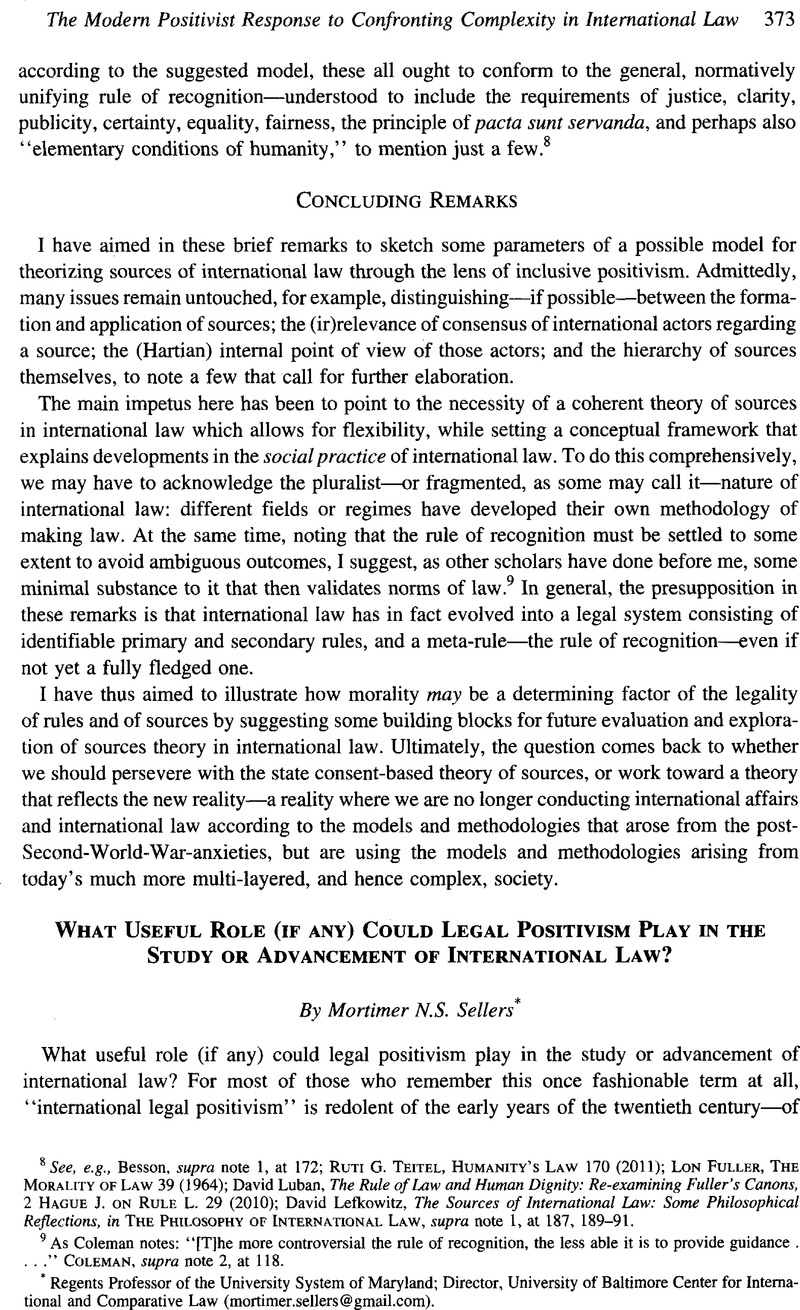No CrossRef data available.
Article contents
What Useful Role (if any) Could Legal Positivism Play in the Study or Advancement of International Law?
Published online by Cambridge University Press: 28 February 2017
Abstract

- Type
- The Modern Positivist Response to Confronting Complexity in International Law
- Information
- Copyright
- Copyright © American Society of International Law 2012
References
1 Lassa Oppenheim, International Law: A Treatise (1905).
2 John Austin, The Province of Jurisprudence Determined 148 (1832).
3 Id. at 6.
4 Id. at 148.
5 See, e.g., Statute of the International Court of Justice, Art. 38, and its antecedents in Henry Wheaton, Elements of International Law 23-27 (1836).
6 See, more recently, H.L.A. Hart, The Concept of Law 208-31 (1961).
7 Wheaton, supra note 5, at 23.
8 Hugo Grotius, de Iure Belli ac Pacis Libri Tres in Quibus Jus Naturae Et Gentium, Item Juris Publici Praecipua Explicantur (new ed. 1646), prolegomena §11.
9 Emer de Vattel, Le Droit Des Gens, Ou Principes de La Loi Naturelle Appliques A La Conduite Et Aux Affaires Des Nations Et Des Souverains, at xxi ff (1758).
10 “Et haec quidem quae jam diximus, locum aliquem haberent, etiamsi daremus quod sine summo scelere dari nequit, non esse Deum, aut non curare ab eo negotia humana.” Grotius, supra note 8, prolegomena, § 11.
11 “Haec vero, quam rudi modo jam expressimus societatis custodia, humano intellectui conveniens, fons est ejus juris, quod proprie tali nomine appellatur.” Id., prolegomena.
12 Christian Wolff, Jus Gentium Methodo Scientifica Pertractatum (1764).
13 Vattel, supra note 9, at xvii.
14 Id. at xix.
15 Id., préliminaires § 7, at 4.
16 Id., préliminaires § 21, at 11-12.
17 Id., préliminaires, § 24, at 13.
18 Id., préliminaires § 25, at 14.
19 Id., § 27, at 15.
20 Id., préliminaires, § 9, at 5 (“[Tļous les Traités, toutes les Coutumes qui vont contre ce que le Droit des Gens nécessaire prescrit, ou défend, sont illégitimes.”).
21 “Le detail des différens Traités et des diverses Coutumes des Peuples appartient à l’Histoire, et non pas à un Traité Systématique du Droit des Gens.” Id. at xxii.
22 Wheaton, supra note 5, at 23 ff.
23 See Hart, H.L.A., Positivism and the Separation of Law and Morals, 71 Harv. L. Rev. 593 (1958)CrossRefGoogle Scholar, on the desirability of being clear, even when one is “clearly wrong.”
24 See, e.g., Fragmentation of International Law: Difficulties Arising from the Diversification and Expansion of International Law, Report of the Study Group of the International Law Commission finalized by Martti Koskenniemi, UN Doc. A/CN.4/L.682/Add.l (May 2, 2006).
25 Vattel, supra note 9, at x.
26 Cf. 3 Adams, John, Defence of the Constitutions of Government of the United States of America 211 (1788)Google Scholar (“a man, however unhappy in his temper, or detestable for his principles, equal in genius and learning to any of his contemporaries.”).
27 For the modern positivist commitment to the separation of law from morality, see, for example, Hart, supra note 23.
28 Thomas Hobbes, Leviathan: Or the Matter, Forme and Power of A Commonwealth Ecclesiasticall and Civill pt. I, ch. XIII, at 63 (1651).
29 UN Charter, pmbl. (“to establish conditions under which justice and ... international law can be maintained.”). Cf. Universal Declaration of Human Rights, pmbl., Ga Res. 217 (III) A, UN Doc. A/RES/217(111) (Dec. 10, 1948) (“Whereas recognition of the inherent dignity and of the equal and inalienable rights of all members of the human family is the foundation of freedom, justice and peace in the world.”).
30 Vattel, supra note 9, at xxiii (“Il me suffit de persuader: et pour cet effet, de ne rien advancer comme Principe, qui ne soit facilement admis par toute personne raisonable.”).
31 Vattel’s response to Hobbes was unequivocal. Id. at xxv (“Si de lâches flatteurs du Despotisme s’élèvent contre mes principes, j’aurai pour moi les hommes vertueux, les gens du coeur, les amis des Lois, les vrais Citoyens.”).
32 Raz, Joseph, The Morality of Freedom 53 (1986)Google Scholar.
33 Cf. Tasioulas, John, The Legitimacy of International Law, in The Philosophy of International Law 97 (Besson, Samantha & Tasioulas, John eds., 2010)Google Scholar.
34 See, e.g., Raz, Joseph, The Authority of Law: Essays on Law and Morality 37 (1979)Google Scholar.
35 Kadi & Al Barakaat v. Council of the Eu Commission, Joined Cases C-402/05 P & C-415/05 P, 3 WLR 872 [2009].




